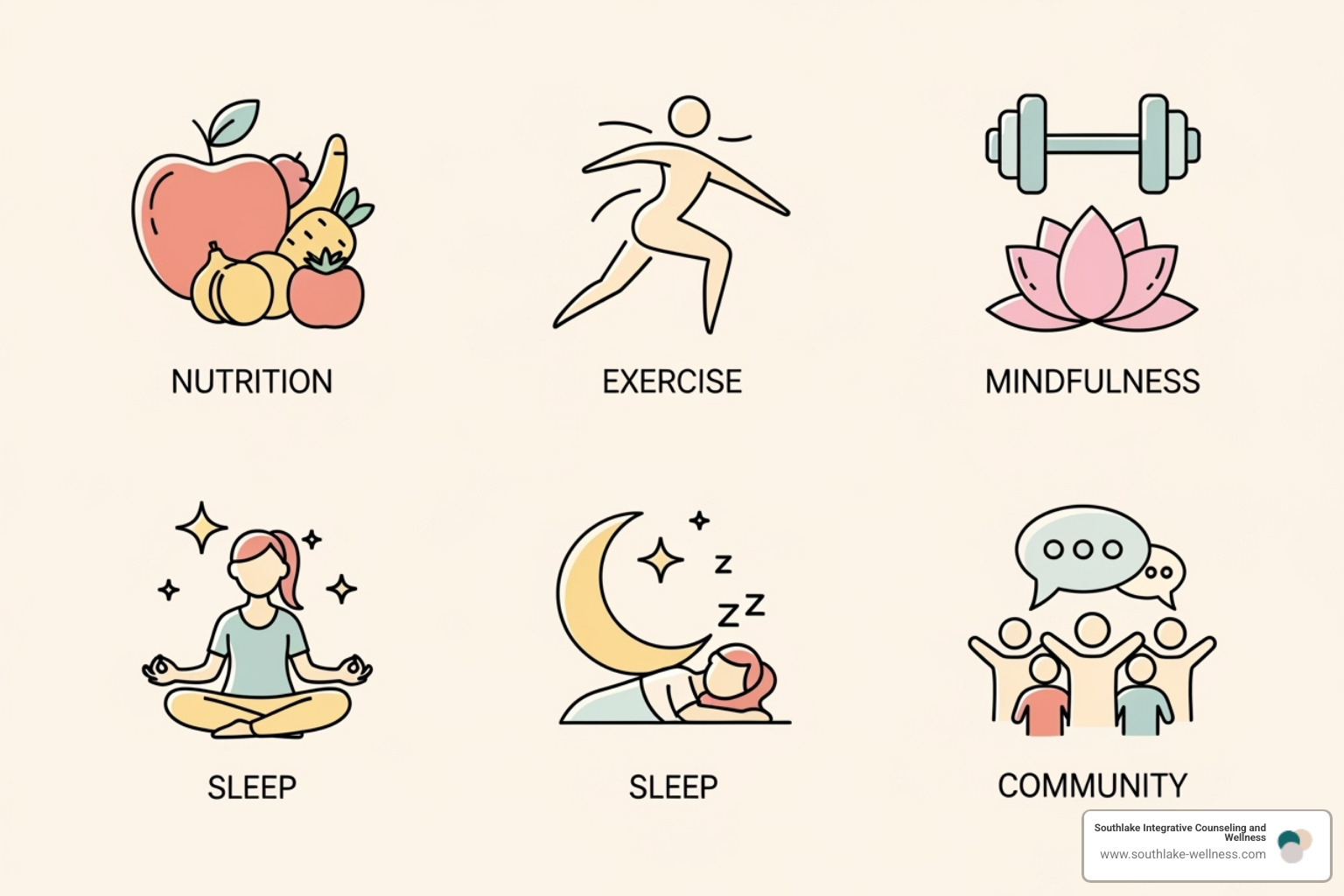
Beyond Symptoms to Whole-Person Well-being
Holistic mental wellness represents a comprehensive approach to mental health that considers the interconnected dimensions of your physical, emotional, mental, and spiritual well-being. Unlike traditional approaches that often focus solely on symptoms or rely primarily on medication, holistic mental wellness recognizes that true healing comes from addressing the whole person.
Key Components of Holistic Mental Wellness:
- Mind-body connection - Understanding how physical health directly impacts mental state
- Nutritional support - Using brain-boosting foods and proper hydration for cognitive function
- Movement and exercise - Leveraging physical activity to increase endorphins and reduce stress hormones
- Mindfulness practices - Developing present-moment awareness to break cycles of anxiety and rumination
- Quality sleep - Prioritizing restorative rest for mood regulation and cognitive function
- Social connections - Building supportive relationships for emotional resilience
- Spiritual wellness - Exploring meaning, purpose, and inner peace
Research consistently shows that holistic approaches address the root causes of mental health challenges rather than just managing symptoms. The mind-body connection lies at the core of this healing approach, highlighting how our mental and emotional well-being directly influences our physical health - and vice versa.
As someone who has spent 14 years customizing therapeutic approaches for individuals struggling with anxiety, depression, trauma, and other mental health challenges, I've witnessed how holistic mental wellness transforms lives by addressing each person's unique needs across all dimensions of well-being. My practice centers on the belief that each person learns, grows, and processes differently, requiring personalized approaches that honor the whole self.

Understanding the Dimensions of Holistic Wellness
Holistic mental wellness is a way of thinking about health that recognizes the deep connection between your mind, body, and spirit. Unlike traditional methods that treat symptoms in isolation, this approach understands that all aspects of your well-being are interconnected. When one area struggles, it affects the others. This proactive approach empowers you to nurture all dimensions of yourself, building a strong foundation of resilience to balance life's demands. For those dealing with challenges like depression, this offers hope beyond symptom management. Explore this in our guide on a holistic approach to depression.
The Mind-Body Connection: The Core of Holistic Mental Wellness
Your thoughts can change your body, and your body can shift your thoughts. This is the mind-body connection, the scientific foundation of holistic mental wellness. When you're stressed, your body reacts with a faster heart rate, tense muscles, and shallow breathing. Conversely, when your body is well-rested and nourished, your mind feels clearer. This constant conversation explains why chronic stress can lead to physical illness and why chronic pain often affects mood. When your brain perceives a threat, it triggers a stress response. While helpful for short-term challenges, a constantly activated system can harm your mental and physical health. Understanding this link opens up healing possibilities. Nurturing your body with practices like mind-body connection massage therapy also cares for your mind. Scientific research shows that changing negative thought patterns reduces physical stress in the body.
The Key Dimensions of Your Well-being
Imagine your well-being as a wheel with multiple spokes, each representing a dimension of wellness. For the wheel to roll smoothly, each spoke must be strong.

Physical wellness is about nourishing your body with good food, regular movement, and restorative sleep. It provides the energy and stability for clear thinking.
Emotional wellness is the ability to understand and manage your feelings healthily, allowing you to steer life's ups and downs with resilience.
Spiritual wellness involves connecting with a sense of meaning and purpose beyond yourself, whether through nature, gratitude, or exploring your values.
Social and community wellness recognizes our need for connection. Quality relationships provide emotional support, reduce stress, and bring joy.
Intellectual wellness keeps your mind engaged and growing through curiosity, learning, and problem-solving.
Environmental wellness is about creating physical spaces that support your mental health and caring for the planet.
Each dimension influences the others. Strengthening one area creates a positive ripple effect, which is the magic of holistic mental wellness.
The Five Pillars of Holistic Mental Wellness
Holistic mental wellness is supported by five key pillars. These are not dramatic overnight changes, but simple, sustainable practices you can weave into your daily routine to build resilience and peace. These accessible tools put you in control of your wellness journey, with each practice strengthening the others. For practical applications, see our guide on Holistic Stress Management Techniques.

Pillar 1: Nutritional Nourishment for Brain Health
What you eat directly impacts your mood, energy, and ability to handle stress, making nutritional nourishment a crucial pillar of holistic mental wellness. Brain-boosting foods include Omega-3 fatty acids (salmon, walnuts) to help reduce depression and anxiety, and magnesium (dark leafy greens, pumpkin seeds) to calm the nervous system. Processed foods and refined sugars can lead to energy crashes and mood swings. Choosing nutrient-dense foods like vegetables, whole grains, and lean proteins gives your brain what it needs to produce feel-good neurotransmitters. Proper hydration is also vital for mood and cognitive function. Try mindful eating—savoring each bite without distraction—to improve your relationship with food and aid digestion.
Pillar 2: Movement as Medicine for the Mind
Movement is one of the most powerful tools for mental wellness. When you exercise, your body produces natural antidepressants called endorphins and reduces the stress hormone cortisol. This doesn't require grueling gym sessions. Gentle practices like yoga, Tai Chi, or even a simple nature walk offer significant physical and mental benefits. Research overwhelmingly confirms that exercise boosts mood; even small amounts of daily activity make a difference. Every bit of movement is an investment in your mental health. For a deeper connection, explore how therapeutic touch and mindful awareness combine in Mind-Body Harmony Massage Therapy.
Pillar 3: Mindfulness and Meditation for Inner Peace
Mindfulness and meditation help you find peace in the present moment instead of worrying about the past or future. Present-moment awareness is about noticing what's happening right now without judgment. This practice helps break the cycles of rumination that fuel anxiety and depression. Research on mindfulness for stress and anxiety shows it changes the brain's stress response, building emotional resilience. You can explore this in our Mindfulness-Based Group Therapy.
Simple ways to practice mindfulness include:
- Mindful breathing: Take three deep, focused breaths.
- Body scan meditation: Notice sensations in your body without judgment.
- Mindful eating: Savor a meal without distractions.
- Micro-recoveries: Take 60-second mental breaks.
- Thought-detachment: View worries as passing clouds.
- Sensory grounding: Use calming scents or textures to ground yourself.
Pillar 4: The Restorative Power of Quality Sleep
Quality sleep is not a luxury—it's essential for holistic mental wellness. During 7-9 hours of quality sleep, your brain processes emotions, consolidates memories, and clears out metabolic waste, which is vital for mood regulation, sharp cognitive function, and a strong immune system. Good sleep hygiene is key. Create a sanctuary in your bedroom: cool, dark, and quiet. Avoid blue light from screens at least an hour before bed. A relaxing bedtime routine (like a warm bath or reading) and a consistent sleep schedule—even on weekends—help regulate your body's internal clock. As research shows, The impact of sleep on overall health is foundational to emotional stability and clear thinking.
Pillar 5: Social Connection and Community
Humans are wired for connection, and loneliness can be as harmful to health as smoking. This pillar is about cultivating quality relationships that offer emotional safety and support, not just collecting social media followers. Strong social connections buffer against life's storms and can significantly reduce the risk of depression and anxiety. While technology helps, it can't replace face-to-face conversations. Building meaningful community can involve joining a club, volunteering, or simply being more present with loved ones. Practices like active listening and offering mutual support create strong bonds. Focus on quality over quantity; a few authentic relationships are more beneficial than many superficial ones. Community involvement fosters the sense of belonging we all need.
Professional Support and Holistic Therapies
While the five pillars are a solid foundation, professional support can help you truly thrive. Seeking help is a wise step toward building resilience. Combining traditional evidence-based therapies with alternative modalities addresses the whole person, promoting deep emotional balance. The key is finding a qualified practitioner for a personalized plan.

At Southlake Integrative Counseling and Wellness, we know healing isn't one-size-fits-all. We offer personalized treatment plans for individuals, couples, and groups, addressing root causes like chemical imbalances, trauma, or life stressors. Our regulated healthcare professionals use evidence-based and evidence-informed treatments to foster genuine healing in a supportive community. Explore our Evidence-Based Therapy Techniques to learn more.
Common Holistic Therapies and Practices
Many holistic therapies can improve your mental health journey alongside traditional methods, helping to access emotions and promote healing.
- Body Psychotherapy: Uses hands-on techniques and breathing exercises to access emotions stored in the body, which is powerful for releasing trauma.
- Acupuncture: An ancient Chinese practice of inserting thin needles to balance the body's energy flow, often effective for anxiety, depression, and stress.
- Aromatherapy: Uses essential oils like lavender for calm or citrus to energize, offering simple mood support through diffusers or topical application.
- Herbal Remedies: Plants like St. John's Wort (for mild depression) and Ashwagandha (for stress) can support wellness. Important note: Always consult with a healthcare professional before starting herbal remedies, especially if you're taking other medications, as interactions can occur.
- Massage Therapy: Reduces stress hormones and releases physical tension tied to emotional stress, strengthening the mind-body connection.
- Emotional Regulation Therapy: Combines mindfulness, body awareness, and cognitive strategies to help you manage emotions effectively. Learn more about developing these essential skills in our article on Emotional Regulation Therapy.
Navigating Challenges on Your Holistic Mental Wellness Journey
A holistic mental wellness journey is rewarding but can have challenges. Understanding them helps you steer with patience.
- Finding qualified professionals: The field is growing, so it's important to find regulated practitioners with evidence-informed approaches. At Southlake Integrative Counseling and Wellness, our team offers comprehensive, personalized care combining psychotherapy, testing, psychiatry, and naturopathic medicine.
- Maintaining consistency: New practices require discipline and patience. Healing is a process, not a quick fix, and it's normal for progress to feel messy at first.
- Overcoming stigma: Societal judgment about mental health and alternative approaches still exists. Normalizing self-care practices helps change these perceptions.
- Personalizing your approach: What works for one person may not work for you. This journey requires experimentation, listening to your body, and being patient as you find what resonates. We can help guide you in developing a balanced, authentic, and sustainable plan.
The Lasting Benefits of a Holistic Approach
Committing to holistic mental wellness offers compounding benefits that transform how you experience life. The beauty of this approach is that its advantages ripple through every aspect of your well-being. Key long-term benefits include:
- Preventing Burnout: By learning to recognize early stress signals, you can implement proactive strategies before stress becomes overwhelming.
- Improved Emotional Regulation: Mindfulness and body awareness help you pause between a feeling and a reaction, improving your relationships and overall quality of life.
- Increased Resilience: You develop a flexible strength that allows you to bend without breaking, helping you bounce back from life's challenges more quickly.
- Better Physical Health: Many people experience improved sleep, decreased inflammation, and more stable energy levels as their body begins to work with them, not against them.
- Greater Self-Awareness and Purpose: Tuning into your body and mind provides a compass for decisions, helping you create a life that feels aligned with your authentic values.
These are not temporary fixes but lasting changes that create a solid foundation for lifelong well-being. For more insights, explore our article on Holistic Mental Wellness.
Conclusion: Begin Your Journey to Whole-Self Wellness
The journey to holistic mental wellness is about seeing yourself not as separate parts to be fixed, but as a whole person deserving of comprehensive care. This whole-person approach integrates your physical, mental, emotional, and spiritual well-being. The five pillars—nutrition, movement, mindfulness, sleep, and social connection—are tools to empower yourself through intentional self-care.
This path is about nurturing your mind, body, and spirit as a unified whole, embracing progress over perfection.
At Southlake Integrative Counseling and Wellness, we honor your unique path. Our team combines evidence-based therapies with alternative modalities, keeping the mind-body connection at the heart of our work for individuals, couples, and groups.
Taking the first step can be the hardest part, but you don't have to do it alone. Your journey to lasting well-being starts now.
Ready to find what holistic mental wellness can do for you? Explore our holistic mental health services and let's begin this transformative journey together.